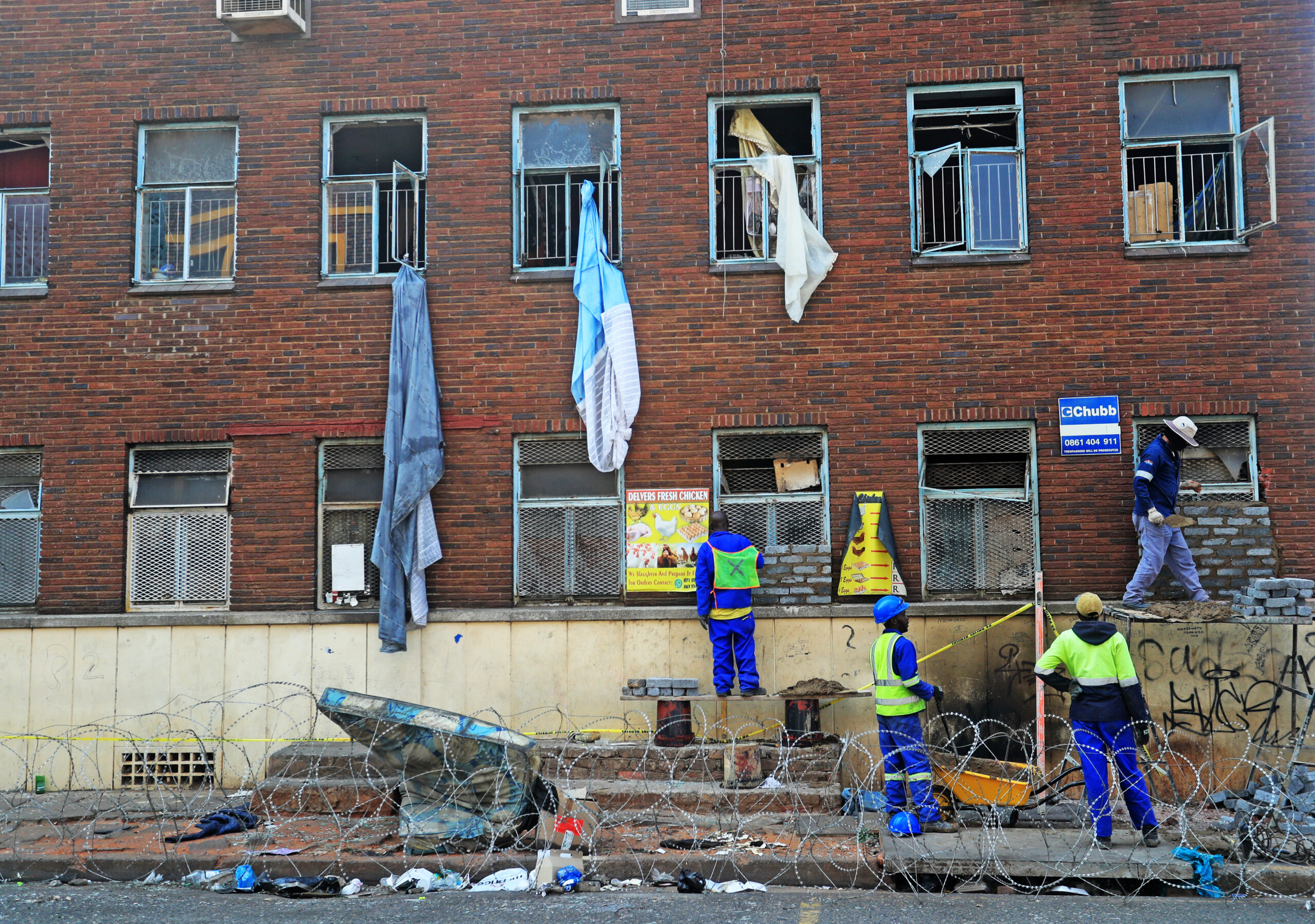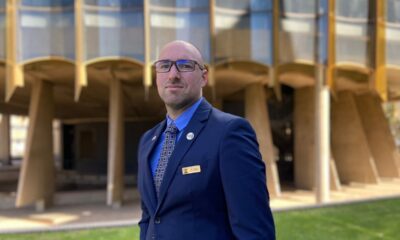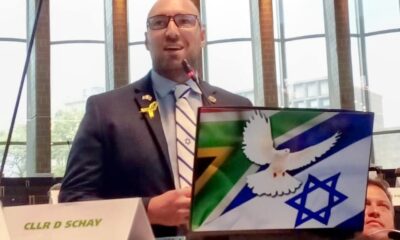
News

Tragic Joburg fire a wake-up call
Jewish property specialists say last week’s devastating Johannesburg inferno, which caused at least 77 deaths, sounded a final warning bell for the City of Johannesburg to clean up its act.
Joshua Green, the managing director of Mafadi Property Management, which manages about 8 500 residential units in the inner city and has thousands of commercial tenants across Gauteng, woke up to the news last Thursday, 31 August, of the tragic fire, which took place during the early hours, engulfing a five-storey hijacked building on Albert Street.
As a volunteer operational director of the fire containment unit for Zaka and a volunteer for other communal organisations such as Hatzolah and the Community Security Organisation, Green felt a sense of foreboding and immediately called to see if there was anything he could do to assist and if it was one of the buildings in his company’s property stable.
“There were enough resources on the scene, and it wasn’t one of our buildings, which are tightly managed and looked after,” he said.
The tragedy has shone light on the proliferation of hijacked buildings in the inner city and resultant squalor and deteriorating health and safety standards, as well as municipal incompetence and ineptitude.
“A hijacked building is a disaster waiting to happen, and should be prevented at all costs,” said Green.
“These buildings are never maintained. There are no safety compliance measures in place. It’s a ticking time bomb of trouble,” he said.
“The hijackers, who often look like normal, well-dressed people, hijack the rental income that’s due to the landlord and eventually water and electricity gets cut and who knows what happens when loadshedding occurs. Are there any fire-safety protocols? Are there fire hydrants and extinguishers, hoses, emergency exists, working lifts? The list is endless.
“The residential property market in the inner city is like going to a massive bus accident every day. There are a number of things that can and do go wrong daily.” But, he says, “The inner city is a beautiful place. It’s a cholent pot of multiple races, nationalities, incomes, and cultures. There’s endless potential.”
Sadly, well intentioned and impressive urban-renewal projects suffer a setback when tragedy like this occurs, say other property developers in the space.
Perpetual crime, corruption, watershedding, and loadshedding also cause havoc.
“When the city cuts off power to a building on a Friday afternoon before Shabbos, or Joburg Water cuts water supply, it can be hell,” said Green.
However, the bigger picture is the dysfunction at the very heart of the city, said Lael Bethlehem who worked for the City of Johannesburg and served as chief executive of the Johannesburg Development Agency.
“The current political coalition is disastrous. Politicians are more preoccupied with coalition squabbles than they are with solving the immense problems of the city. It’s this mismanagement and poor governance that creates conditions for further disasters,” she said.
“Johannesburg is a difficult city to govern, with complex, large-scale problems. It requires resources, imagination, and determination. Even the best leadership would find it difficult to solve the complex issue of building hijackings and inner-city housing shortages, but it can be done.”
Bethlehem is hoping this sorrowful tragedy will provide a turning point.
“More people died last week than during the Sharpeville massacre, and that was a huge turning point in our country. The tragedy of Marikana did give rise to changes in the mining industry, so we can only hope last week’s fire will be the turning point in the way we experience the management of the city. Or will it be another in a series of disasters?”
“A tragedy of this scale sets the city back,” said one property manager, who asked to remain anonymous for his security.
“Johannesburg CBD is a massive area made up of a collection of districts. There are pockets of excellence and pockets of decay. Some areas are perfectly clean and safe, with coffee shops, bars, and flower sellers. The part of the city where the fire occurred is the underbelly of town. All is not lost, but this is a serious warning bell.
“The shocking fire didn’t surprise me. I’m amazed this hasn’t happened more often – and it will,” said one developer who specialises in inner-city student accommodation, who also asked to remain anonymous, also concerned about his safety.
“That building should have been shut down long ago and transformed into affordable city accommodation. Once a building is hijacked, it becomes part of a vicious cycle of neglect and decay as the city is incapable of enforcing by laws and basic law and order. Residents of these buildings use buckets for toilets, disposing the waste in basements, it’s appalling. Where do our rates and taxes go?
“I’m moving out of the city, it’s too hard. Property values have dropped but rates and taxes keep rising, slowly eroding one’s return, and there’s zero capital appreciation on the property.
“Every developer will tell you about the sheer incompetence and ineptitude of municipal workers, and the lack of the city’s ability to run things properly,” he said.
Another commercial property owner who prefers to remain anonymous said he felt trapped by circumstances.
“My building is only a few blocks from last week’s tragic fire, so it came as a wake-up call to make extra sure all fire protocols are in place, which they are.”
His main issues are that his tenants are low-income, small-time earners selling anything from fabric to electrical appliances, who can barely afford to pay rent.
“If they don’t make turnover that month, I simply don’t get paid. Whereas a few blocks away near Absa, it’s like a different country. Big business, first-rate tenants who can afford massive rentals. Landlords of different areas, some with more affluent tenants than others, are charged similar rates and taxes, which keep rising so at the end of the day, I’m battling to come out.”
He said his property had devalued because of the state of the city in that section of town, so he was forced to stay put.
“I can’t sell my property because it’s worth nothing, so it’s better to stay here and work. It’s been my whole life, it’s what I know, but I’m not sure if I can sustain this. I feel locked in.”
Two Jewish property owners in different parts of the city, one in Doornfontein and the other on the outskirts of the city, say their buildings have been hijacked.
“Three of my properties have been hijacked,” said the one who wishes to remain anonymous for fear of reprisals.
“These are dangerous men who have come from another province who believe the property rightfully belongs to them. The law favours them over the landlord and no matter what I have tried – and believe me I’ve tried everything from the courts to the Red Ants to even unlawfully barricading doors – I feel powerless.”
“I receive zero rent, but I still pay rates and taxes to try prevent the buildings from becoming derelict. I have switched off the electricity, but this doesn’t stop them from bribing city officials to reconnect the power the next day,” he said.
Another said, “My residential building has been hijacked for six years. The law isn’t on my side, even though I own the property. There are so many hurdles, it’s exhausting, nothing is simple. I’ve been trying to get a court order to evict the occupants, but it takes forever, and I’m losing hope. Last week’s fire could have been prevented if only the city cared enough to maintain buildings and was more helpful. I would like to fix the building and create decent accommodation, but I’m losing hope of this ever happening as I see my investment going down the drain. I drive past, and don’t even go inside because it’s too dangerous there.”










